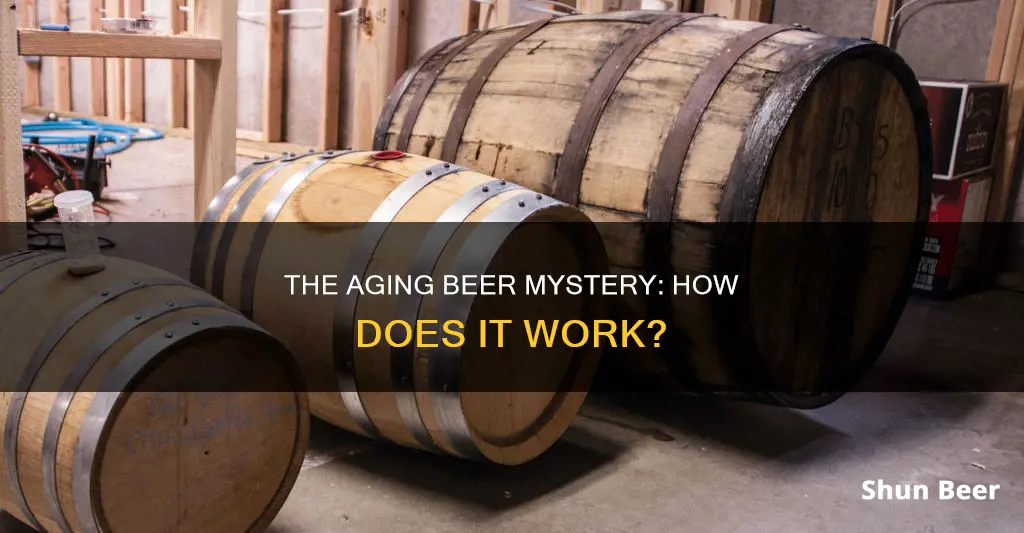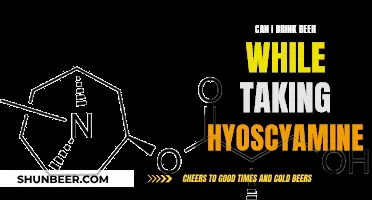
Aging beer is an increasingly popular practice among beer enthusiasts, who are discovering the benefits of leaving beer in a cellar for a few months or even years. The process, known as cellaring, involves allowing the beer to mature under specific conditions to achieve nuances in its flavour and aroma. Beers that are suitable for aging include sour beer, strong beer (with an alcohol content of above 8% ABV), and smoked beer. Beers with high ABV often age well because the alcohol content acts as a preservative. However, aging beer is a delicate process and can result in diminished flavours if not done correctly. Factors such as light exposure, temperature, and the type of beer can impact the outcome.
What You'll Learn

Temperature: 55°F (12.8°C) is ideal for ageing most ales
When it comes to ageing beer, temperature is a critical factor. Indeed, temperature control is the most important aspect of creating an ideal beer cellar environment for ageing beer over an extended period.
For most ales, the ideal ageing temperature is 55°F (12.8°C). This temperature is widely accepted as the sweet spot for ageing ales, allowing the beer to mature at an appropriate rate. Deviating too far from this temperature in either direction can be detrimental to the ageing process. If the temperature is too low, the maturation process slows down significantly, while higher temperatures can accelerate the ageing process, potentially leading to off-flavours.
To put this temperature into context, ales are typically fermented at higher temperatures, around 65°F (18.3°C). Therefore, ageing ales at 55°F (12.8°C) means maintaining a temperature slightly lower than the fermentation temperature, which is ideal for promoting the desired maturation process.
Maintaining a consistent temperature is also crucial. Fluctuations in temperature can impact the ageing process, potentially causing undesirable flavours to develop. Aim to keep the temperature as close to 55°F (12.8°C) as possible, with minimal variations, to ensure the best results.
By ageing your ales at this ideal temperature, you'll be able to unlock the full potential of your beer, allowing it to develop nuanced flavours and aromas that can only be achieved through proper ageing.
Beer Towers: How Do They Work?
You may want to see also

Light: Keep UV light out to avoid a skunked beer
Light, specifically UV light, is a key factor to consider when ageing beer. If you're ageing beer, your cellar should be in total darkness. Even artificial light can cause damage to beer.
UV light interacts with hops in beer to create a light-struck flavour, also known as "skunked" beer. This is why most beers are packaged in brown bottles, as brown glass absorbs the blue, purple, and green wavelengths that catalyse the skunk reaction. Clear, green, and blue glass bottles all allow some of these damaging UV wavelengths into the beer. Green bottles are somewhere in the middle; they let in less light than clear bottles but more than brown bottles.
To avoid skunked beer, you can store your beer in a sealed box or paper bag, or use stainless steel containers, which totally block light. If you're using glass carboys, be careful to avoid exposure to sunlight, as well as LED and fluorescent bulbs.
Beer Festivals: A Guide to the Frothy Fun
You may want to see also

Alcohol content: Beers with 8%+ ABV are better for ageing
When it comes to ageing beer, not all beers are created equal. Beers with an ABV of 8% or higher are better suited to ageing than their lower-ABV counterparts. This is because the alcohol content itself acts as a preservative, slowing the ageing process and making the beer more resilient to staling.
Beers with a high alcohol content tend to respond better to ageing than those with a lower alcohol content. The exception to this rule is high-alcohol beers that feature hoppy, fruity, or other subtle flavour notes. The compounds responsible for these flavours tend to break down over time, so these beers are better enjoyed fresh.
Beers that are ideal for ageing include sour beers, strong beers, and smoked beers. The citrus in sour beer acts as a preservative, keeping the beer fresh for longer, as do the smoke phenols in smoked beer.
When it comes to ageing beer, temperature is also a critical factor. The ideal temperature for ageing beer is between 52°F and 55°F (11°C to 13°C). Colder temperatures will slow the ageing process, while warmer temperatures will accelerate it.
It's worth noting that ageing beer is a delicate process and can have both positive and negative effects on the final product. While ageing can bring out new flavours and reduce bitterness, it can also lead to undesirable flavours if not done correctly.
Additionally, it is important to store beers intended for ageing in a dark space with minimal light exposure. Ultraviolet light can react with the compounds in the beer, creating a skunky flavour that is generally unpleasant.
Understanding Glycol Beer Chillers: How Do They Work?
You may want to see also

Beer type: Sour, strong, and smoked beers age well
Aging beer has become a global phenomenon, with many enthusiasts exploring the benefits of leaving their beer in a cellar for a few months. While aging can positively impact a beer's flavour profile, it is important to ensure that it is done correctly to avoid diminishing the flavours.
Sour, strong, and smoked beers are some of the best types of beer for aging. Here's why:
Sour beers get their distinctive sour taste from the activity of microorganisms such as Lactobacillus or Pediococcus. The citrus in sour beer acts as a preservative, helping to keep the beer fresh for longer. Additionally, sour beers, which often have lower alcohol content, have a low pH, making them less susceptible to oxidation. As sour beers age, their sourness tends to fade, allowing other flavours in the beer's profile to become more detectable, resulting in a more layered taste experience.
Strong beers, on the other hand, typically have a high starting gravity and high alcoholic strength (greater than 8% ABV). The alcohol content in strong beers acts as a preservative, slowing down the aging process. Aging strong beers can lead to the development of complex flavours. Higher alcohols with more carbon atoms than ethanol can give strong beers a boozy or hot taste, but over time, these higher alcohols can combine with acids to form esters, resulting in fruity flavours and aromas like pear, rose, or banana. As these higher alcohols change and drop out of the flavour profile, sweeter and more subtle flavours can emerge, adding complexity to the beer.
Finally, smoked beers are characterised by the presence of smoke phenols, which also act as preservatives. Wood smoke flavours in smoked beers tend to age and become sweeter, resembling pipe or cigar tobacco rather than wood smoke. Aging smoked beers can lead to a more integrated flavour profile, as the smokiness mellows and becomes less intense.
When aging sour, strong, or smoked beers, it is important to consider factors such as temperature, light exposure, and storage practices to ensure optimal results.
Beer Taxes: Effective or Just a Burden?
You may want to see also

Bottle colour: Brown bottles block harmful UV rays
When it comes to ageing beer, one of the most important factors to consider is light exposure. UV light interacts with hops in beer, creating a "skunked" or "light-struck" flavour. This is why it is crucial to keep your cellar dark and your beers shielded from light.
The colour of the glass bottle you use for ageing beer can significantly impact its susceptibility to skunking. Clear glass bottles, for example, allow harmful UV rays to penetrate the beer, quickly altering its flavour and making it smell and taste offensive.
Brown bottles, on the other hand, are designed to block these harmful UV rays. The dark colour of brown glass acts as a shield, protecting the beer from the sun's rays in a similar way that sunglasses protect your eyes on a sunny day. By using brown bottles, you can effectively reduce the amount of UV light that reaches the beer, thus prolonging its shelf life and maintaining its desired flavour profile.
After World War II, green bottles also became popular due to a shortage of materials needed for producing brown glass. However, green bottles are less effective at blocking UV rays, and their use can result in sunlight damaging the beer over time.
Today, brewers have the option to apply clear, UV-protected coatings to glass bottles, which can help keep the beer fresh regardless of its colour. Nonetheless, brown bottles remain a reliable choice for those looking to minimise UV exposure and maximise the ageing potential of their beer.
Uncapping the Secret: Beer Vending Machines Simplified
You may want to see also
Frequently asked questions
Beer ageing is the process of allowing beer to mature under specific conditions to achieve nuances in its flavour and aroma that can only be achieved with ageing.
The ideal temperature for ageing beer is around 55°F (12.8°C). The cellar should be dark to prevent UV light from interacting with the hops in the beer and creating a "skunked" flavour. Bottles should be stored upright to avoid unwanted flavour manipulations.
Beers that age well include wild beers such as Flanders Reds, lambics, and barrel-aged American wild ales, as well as malty beers like quads, barleywines, and imperial stouts. Sour beers and strong beers with high alcohol content (above 7% ABV) are also good candidates for ageing.







